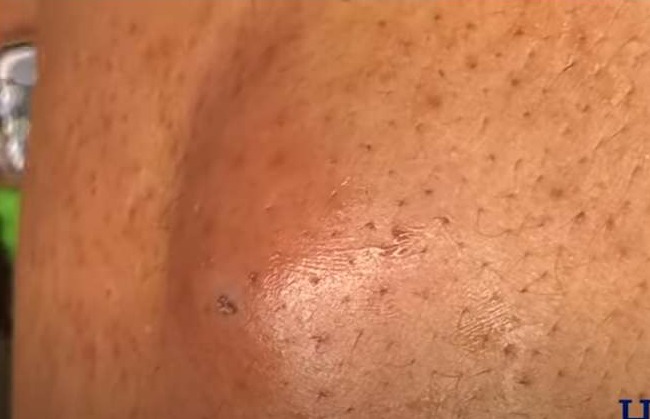

Benzoyl Peroxide: Typically a main ingredient in many acne facial cleansers and lotions, benzoyl peroxide goes into your pores to lift and remove excess oil, dirt and debris (acne-causing agents).There's a wide range of treatment options that (when combined with stronger oral antibiotics) have shown to combat those pesky red bumps for good. While cystic acne is the most severe type of acne you can have, the good news is that you won't have to live with it forever. Here's the best ways to treat cystic acne on other parts of your body Various prescription treatments are available.
#MASSIVE CYSTIC ACNE POPPING PROFESSIONAL#
Talk to your dermatologist - In the event nothing seems to get rid of your folliculitis, then you may need professional help. Use a product containing lactic acid or salicylic acid for best results. Use a gentle exfoliator - If your buttocks gets irritated easily, then consider using an exfoliator for that area. While sweating can be good for your skin, you don't want to leave it there as it can clog your pores, especially on your buttocks. Wash away sweat - Working out can lead to significant sweat buildup. They can help keep your buttocks clear and healthy. If you're prone to butt breakouts, then follow these tips. Ultimately, popping a cyst is painful, so leave that work to a licensed physician. There's also the high risk of developing an infection. It can even lead to cysts forming elsewhere. Popping a cyst can result in the inflammation going to other body parts. But if you develop one, then it's critical you don't pop it. Never pop a cyst on your buttocks, it does more harm than good!Ĭysts are rare on the buttocks. There are a few key details that can help you identify what you have on your body. But the right one for you depends on what precisely you have. Various treatments are available to treat cysts and boils. Folliculitis may begin as small lumps, but over time, it can result in itchy, large cysts that require prompt medical attention. This can occur from waxing, wearing tight clothing, or chronic rubbing. Ultimately, it's caused by a fungal or bacterial infection. In fact, it's the result of inflammation in the hair follicles that lead to a condition called folliculitis. If you notice what looks like acne on your buttocks, then you need to know that those bumps are not actually acne. Butt acne isn't actually acne-let us explain On the surface, this leads to a large, red bump that's more severe than a regular pimple.Ĭystic acne has been found to be more prevalent around the mouth and on the chin. 
In some people, this leads to a breakout underneath the skin. This leads to a growth of bacteria within your pores. Hormonal imbalances or shifts in the body can stimulate oil production. The reason for this is due to oil glands. But in other cases, it also develops on the chest, back, and arms. Puberty certainly results in this, but pregnant and menopausal women also have a greater risk due to changes going on in their bodies.Ĭystic acne occurs mostly on the face, not your buttĬystic acne most commonly affects the face.
Hormonal changes - Acne is more likely to occur when your hormones fluctuate wildly. However, behavioral changes, such as maintaining a different diet from your parents, may limit its severity in you. Family history - While acne affects everyone differently, you're probably more likely to get it if your parents had it. This includes foods high in sugar as well as dairy products. Diet - In general, some foods seem to make people's acne worse. However, there are several theories that may hold some weight. The jury is still out on what precisely causes cystic acne. You need to see a medical professional instead. While this condition can be painful or itchy, it's important to not pop or pick it. People with a family history of cystic acne. Certain individuals are more likely to develop cystic acne, such as: But it has been known to develop on the back, shoulders, chest, and upper arms. But when cystic acne forms, it's more sensitive and painful.Ĭystic acne usually impacts the face. Regular pimples are fairly superficial and only impact the surface of the skin. Since it's so deep, it's much more difficult to treat compared to regular forms of acne, like blackheads and whiteheads. Cystic acne-the most serious type of acneĬystic acne is a severe form of acne whereby an inflammation occurs deep within the skin. Over time, it can become infected and turn into a cyst, which still requires prompt medical treatment. It's actually a condition known as folliculitis, which is an infection of the hair follicles. However, "cystic acne" in that region is not technically acne.






 0 kommentar(er)
0 kommentar(er)
